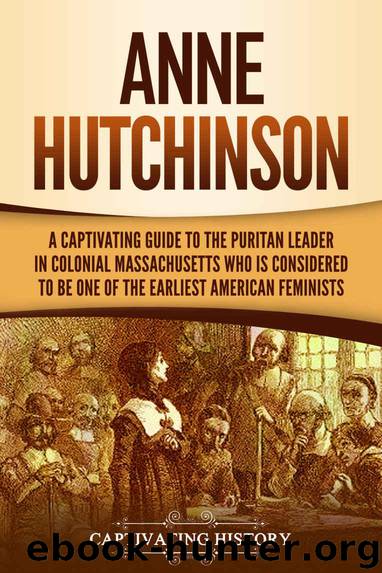Anne Hutchinson: A Captivating Guide to the Puritan Leader in Colonial Massachusetts Who Is Considered to Be One of the Earliest American Feminists by Captivating History

Author:Captivating History
Language: eng
Format: azw3, epub, mobi
Published: 2020-03-01T23:00:00+00:00
Chapter 5 – The Hutchinson Trial
The free grace advocates who held public office under the former Governor Henry Vane were voted out during the course of the election cycle. All eyes now focused upon the true source of their discontent—Anne Hutchinson.
On November 7th, 1637, she was asked to appear before the court, which was being held in Newtown, Winthrop’s new base. It was a four-mile trip. Winter had come early that year, so the weather was frigid, but Anne and her family made their way there, despite the freezing temperature. Because horses could break their legs on ice, the Hutchinsons had to make their way on land after crossing the Charles River. Anne’s son Edward was specifically required to attend because he had signed the petition supporting John Wheelwright prior to his trial and banishment. Four of William and Anne’s male children were now of age and, as freemen, were entitled to vote at the trial, so they were in attendance as well.
The trial took place in a cramped colonial meetinghouse. Windows spanned only one side of the room, but deep plunging shadows draped over all the walls. There was no fireplace there, and the low-ceiling room was merely lit by waning candles, giving it an ominous appearance. Anne wore a black dress of serge, a type of twill fabric, and had wrapped herself in a cloak against the chilly wind that occasionally whistled through the cracks of the walls. As was customary, she had a white neckerchief on her shoulders and the traditional coif. Forty magistrates filed into this building, which was known as the Great and General Court of Massachusetts. The court staff alone was large. There were nine magistrates, thirty-one deputies, a whole team of assistants, and fourteen freemen representing the towns in the colony.
The court was deliberately stacked against Hutchinson, as Winthrop had dismissed the judges who were known to favor her. Among the magistrates, called “divines,” were Reverend Zechariah Symmes, with whom Anne had carried on a contentious discussion on the ship over to America, and Reverend John Wilson, the pastor in Boston whom Anne had criticized at her conventicle meetings. Reverend Peter Bulkley was one of the most prominent attendees there, as he was admired for his extensive knowledge in the field of theology, but he was known to be very critical of women. Reverend Thomas Dudley, who had been a former governor of the colony, was a known legalist, and he was appointed to serve as the deputy judge. The men of the court wore thick greatcoats, leather gloves and hats, linen shirts, knickers, and thick stockings. They took their places on a long bench facing the people in the court. With a flourish, Governor John Winthrop marched in and took his place in the center. He was to serve as both judge and prosecutor.
Although the court was stacked against Anne, the audience contained many people who supported her. Her husband, William, of course, was there, along with many of his colleagues in the mercantile business.
Download
Anne Hutchinson: A Captivating Guide to the Puritan Leader in Colonial Massachusetts Who Is Considered to Be One of the Earliest American Feminists by Captivating History.epub
Anne Hutchinson: A Captivating Guide to the Puritan Leader in Colonial Massachusetts Who Is Considered to Be One of the Earliest American Feminists by Captivating History.mobi
This site does not store any files on its server. We only index and link to content provided by other sites. Please contact the content providers to delete copyright contents if any and email us, we'll remove relevant links or contents immediately.
The Art of Coaching Workbook by Elena Aguilar(51173)
Trainspotting by Irvine Welsh(21644)
Twilight of the Idols With the Antichrist and Ecce Homo by Friedrich Nietzsche(18626)
Fangirl by Rainbow Rowell(9231)
Periodization Training for Sports by Tudor Bompa(8255)
Change Your Questions, Change Your Life by Marilee Adams(7762)
This Is How You Lose Her by Junot Diaz(6877)
Asking the Right Questions: A Guide to Critical Thinking by M. Neil Browne & Stuart M. Keeley(5764)
Grit by Angela Duckworth(5609)
Red Sparrow by Jason Matthews(5468)
Paper Towns by Green John(5181)
Room 212 by Kate Stewart(5105)
Ken Follett - World without end by Ken Follett(4724)
Housekeeping by Marilynne Robinson(4436)
The Sports Rules Book by Human Kinetics(4379)
Papillon (English) by Henri Charrière(4263)
Double Down (Diary of a Wimpy Kid Book 11) by Jeff Kinney(4261)
The Motorcycle Diaries by Ernesto Che Guevara(4090)
Exercise Technique Manual for Resistance Training by National Strength & Conditioning Association(4063)
